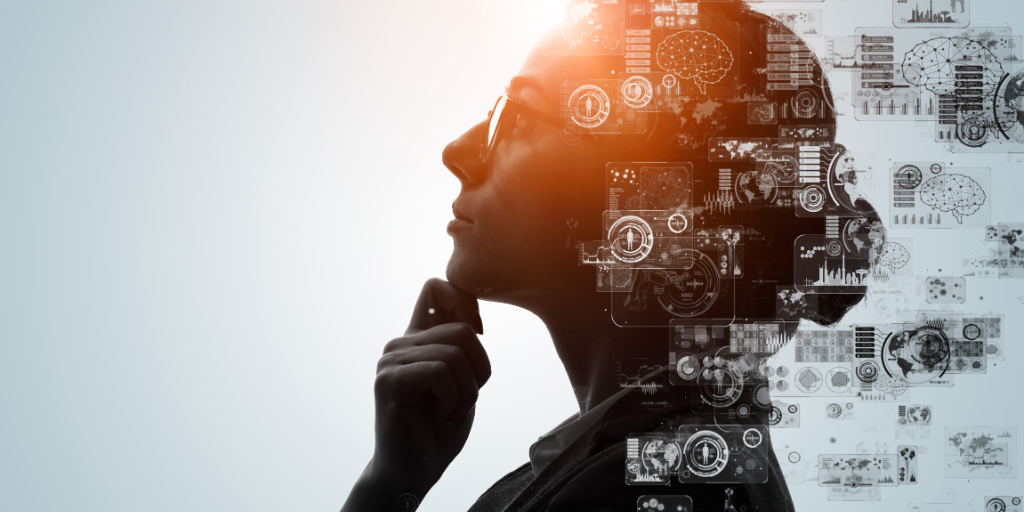There’s something very authentic and real about the connection created by every individual recognition moment. But with artificial intelligence (AI) rapidly growing and evolving, how do you make sure employee recognition stays authentic and impactful? At BI WORLDWIDE, we don’t expect that AI in the workplace will be used to write evocative, meaningful, and celebratory content, but we do expect it to assist in creating something detailed, accurate and relevant.
Topics covered:
- The role of AI in the workplace
- 4 ways AI can be used in the workplace to improve employee recognition
- Striking the right balance
The Role Of AI In The Workplace
AI is one of the most disruptive technologies of the 21st century and is being used to transform many industries. By using data and algorithms to train its systems, AI has the capacity to analyse data, recognise patterns, and offer insights that replicate human intelligence.
In the workplace, AI is used for a variety of tasks such as managing schedules and analysing big data sets. Its versatility and potential have no doubt supported the fact that 70% of employees are excited about AI’s ability to reduce the burden of their workloads, according to the Microsoft Work Trend Report 2023.
Whatever industry you are in, here are just a few of the ways in which AI can be used to improve employee recognition.
4 Ways AI Can Be Used In The Workplace To Improve Employee Recognition
From automating tasks to supporting the brainstorming process, AI is transforming the workplace. Yet, how can AI be used to boost employee recognition? Understanding the four key facets of impactful recognition highlights the significant roles that both humans and AI play in this process.
#1. Ensuring that recognition is delivered at the right time
Providing recognition promptly helps both the recipient and the recogniser recall the specific actions and behaviours relating to the recognition increasing the chances for that behaviour to be repeated in the future. When recognition is delayed, the value and impact of it decreases, risking demotivation and disengagement.
How can AI help?
In the workplace, AI can alert managers and employees when someone could be recognised. This could be because they have made good progress towards a goal, accomplished a goal, were recognised by someone else or have not been recognised recently.
When AI identifies an opportunity for employee recognition, use common sense to assess this. Ask yourself whether this is an appropriate time to recognise the employee, or whether the act of recognition is coming too early or too late.
#2. Making recognition more meaningful
Meaningful recognition is specific and heartfelt. Effective employee recognition needs to be personalised and outline reasons for the recognition as this supports overall transparency, logic and can inspire others.
How can AI help?
No matter how embedded recognition is within a workplace, it can sometimes be a rushed process. Other demands of the working day may mean that sometimes people need a nudge to provide more detail when writing their recognition. AI can help by alerting the author to be more specific or provide prompts to encourage people to use their creativity to create a more detailed message
#3. Delivering more personalised instances of recognition
Understanding how people like to receive recognition is critical to its success. Whilst some enjoy public recognition others prefer a more one on one approach. Personalising your recognition approach demonstrates you value and understand the individual, increasing its meaningfulness and building trust and loyalty. When employees feel seen and valued as individuals, they are more likely to stay engaged and committed to the organisation.
How can AI help?
AI can be used to inform managers of how their employees like to be recognised. While this can support the process of creating personalised instances of recognition, ultimately it is up to the manager to use their emotional intelligence to create a recognition moment that is personalised and meaningful to the recipient.
#4. Ensuring recognition is comparable to the effort
Over and under-awarding can both impact motivation, performance and workplace dynamics. Whilst over-awarding can create short-term motivation boosts, over a prolonged period it can lead to an expectation escalation where employees might come to expect even greater rewards for similar achievements. Frequent recognition can lead to a situation where employees are desensitised to its impacts, diminishing intrinsic motivation, and reducing the joy and satisfaction derived from the work itself. Comparably under-awarding can impact an employee’s sense of value. When employees feel undervalued it can lower job satisfaction, diminish their motivation, and increase employee turnover.
Whilst equity across the workforce is vital, it is important to understand how employees perceive the value of the recognition they receive and amend processes accordingly.
How can AI help?
In this context, AI can suggest appropriate awards based on the type of achievement and size of the goal. However, human empathy is critical in determining what recognition and reward would feel meaningful and appropriate to the recipient.
What’s next?
A tool like BI WORLDWIDE’s Recognition CopilotTM helps participants create meaningful and authentic recognition. This personal recognition assistant includes features that detect biases, translate messages to the recipient’s primary language, correct spelling and grammar, and ensure specificity and relevance.
Strike the right balance with BI WORLDWIDE
Meaningful recognition is profoundly personal, forging connections that benefit not only the recipient but also the giver. While AI in the workplace undeniably streamlines and enhances our daily processes, attempting to exclude human involvement from recognition could have adverse effects on a company’s culture and overall performance. To remain effective and serve as a vital lifeline for organisations, recognition programs must retain the human element, preserving genuine connections rather than fully automating with AI.
Want to learn more about BI WORLDWIDE’s recognition solutions
Check out our thought leadership, how we help section or get in touch.
